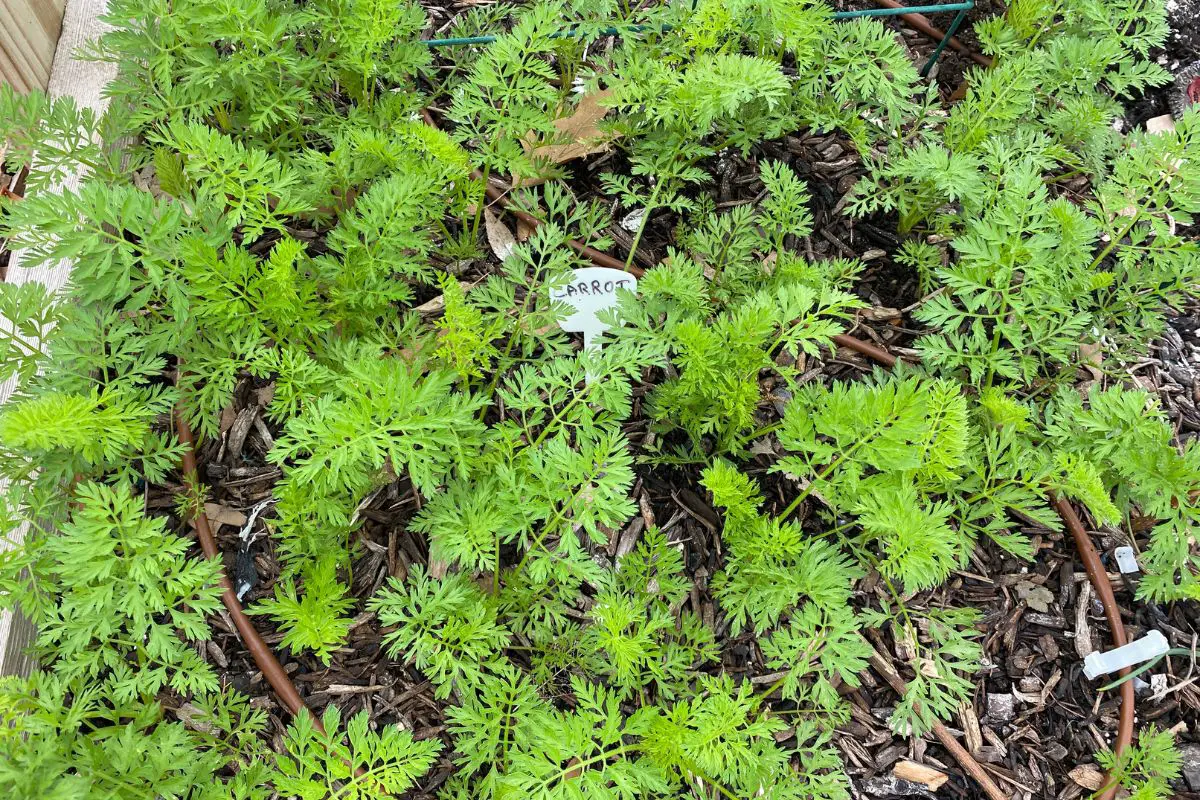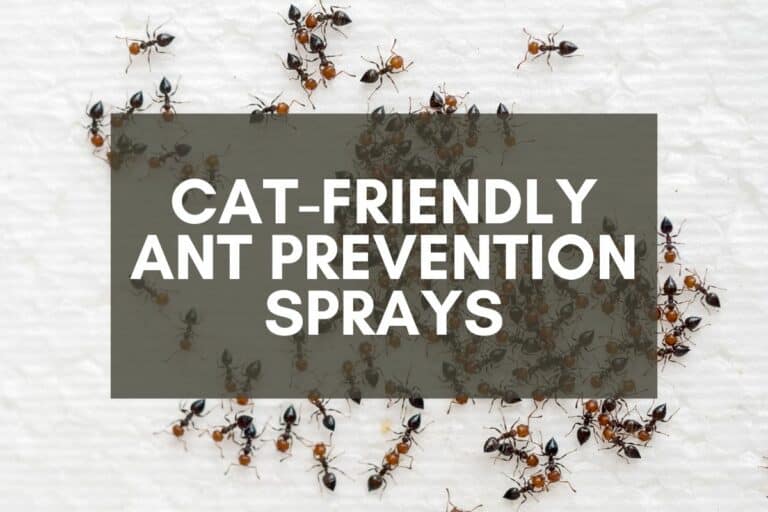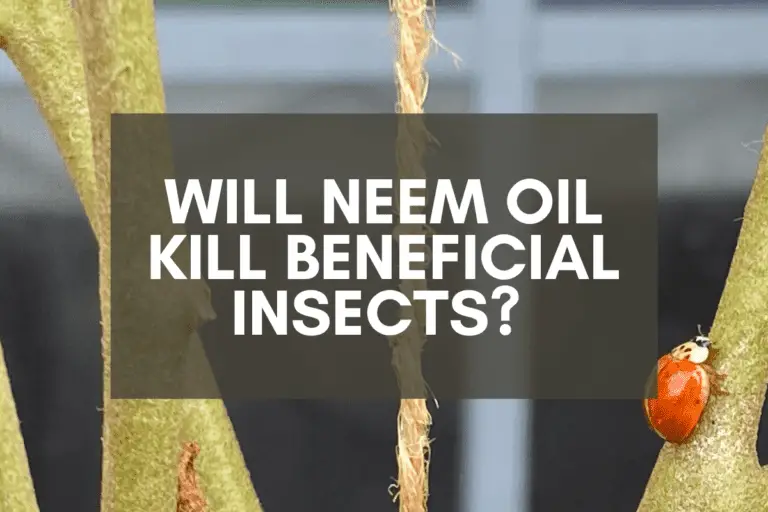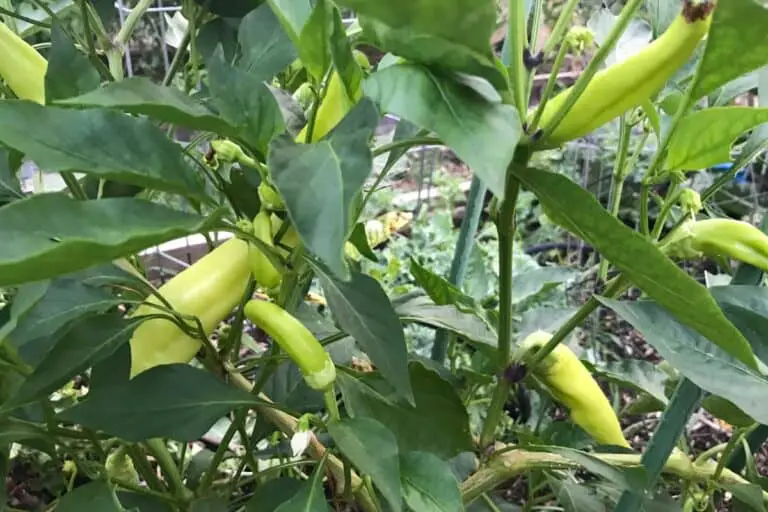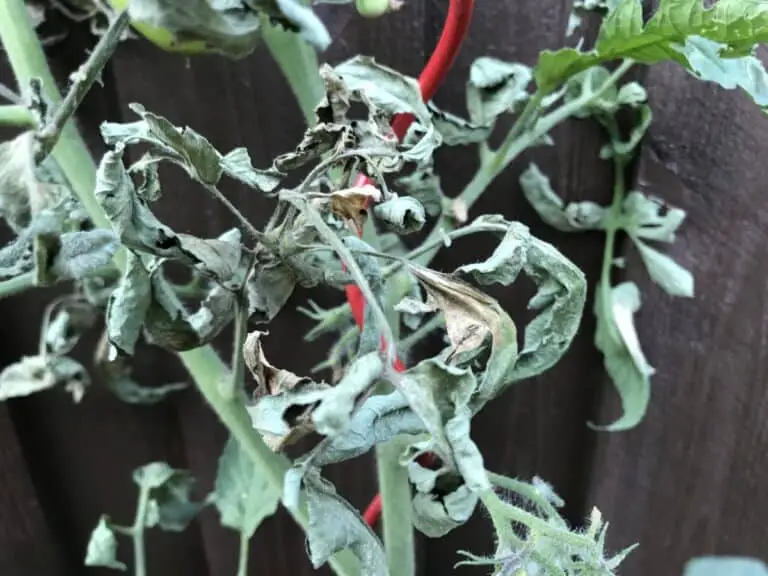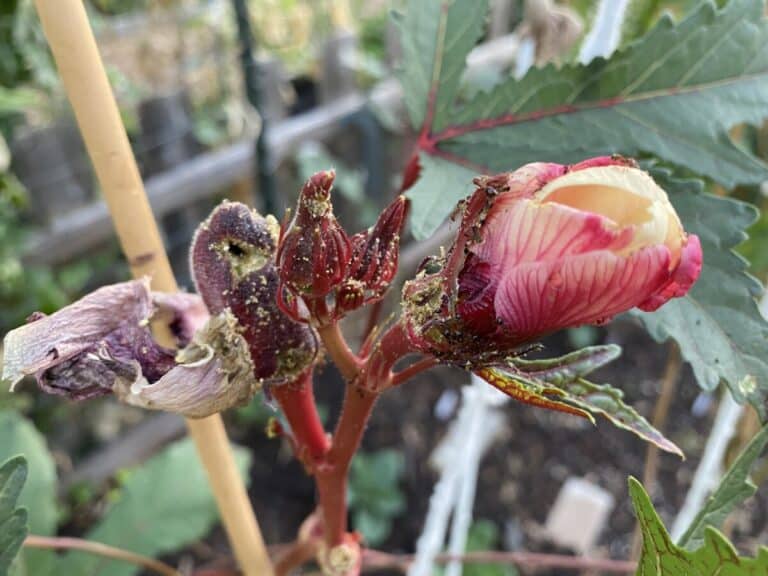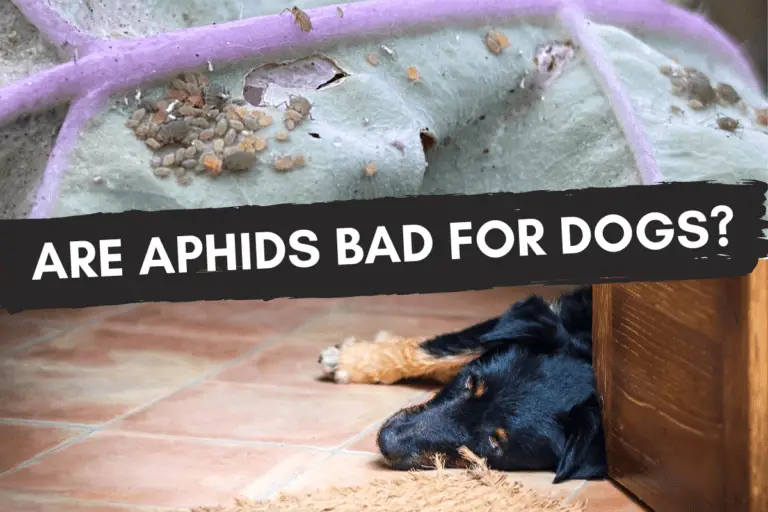Ants in Your Carrots? Here Are 10 Ways to Get Rid of Them
I love growing carrots. Hands down, the best, crunchiest, and sweetest carrots I’ve ever eaten are always homegrown.
Because of this, carrots are one of the vegetables I can’t help myself from checking on anytime I’m in the garden. That’s why I was alarmed when, one day, I saw a ton of ants on the base of my carrot tops.
What was going on? Why were ants in my carrots?
Ants will typically gather on carrot greens because they’re searching for or tending to aphids, which produce a sugary byproduct called honeydew as they feed on carrot greens. The best way to get rid of ants is to first get rid of aphids by spraying plants with an organic liquid soap spray.
Ants are aphids’ benefactors and protectors. They’ll feast on the honeydew while simultaneously defending aphids from beneficial predatory bugs.
Simply put, if you don’t get rid of the aphids, you won’t get rid of the ants.
In this article, I’ll discuss what’s going on in your garden and share 10 different ways that you can keep ants out of your carrot plants.
10 Ways to Get Rid of Ants in Your Carrots
Now that you know why ants will congregate on your carrot greens, you’ll want to learn about natural, organic ways to get rid of those ants and aphids.
I’ll discuss these 10 methods below and give you tips and best practices for each of them:
- Fertilization
- Insecticidal Soap
- Beneficial nematodes (biological control)
- Borax Bait
- Diatomaceous Earth (DE)
- Proper Watering
- Peppermint Essential Oil
- Companion Planting
- Trap Crops
- Sluggo
With the exception of red fire ants and leafcutter ants, most ant species won’t cause any problems in your garden. They can even help you out by taking care of unwanted bug species.
But if they’re protecting aphids, you’ll need to keep an eye out for early infestations and deal with aphids promptly before they spread from plant to plant.
Aphids come in many different colors–black, green, red, yellow, and white are some of the more common colors–so be on the lookout for little colored specks since those are often signs you’ve got an aphid infestation.
1. Fertilization
Because carrots are slow to get going once seeded, I know it’s tempting to over fertilize your carrots to speed things up.
Since it’s the new carrot top growth attracting the aphids and their protector buddies, apply smaller amounts throughout the growing season instead of fertilizing your carrots all at once.
And here’s a tip: Fertilizers have different combinations of nitrogen (N), phosphorous (P), and potassium (K), so when you see the N-P-K numbers on the side of the bag, avoid fertilizers that are high in nitrogen.
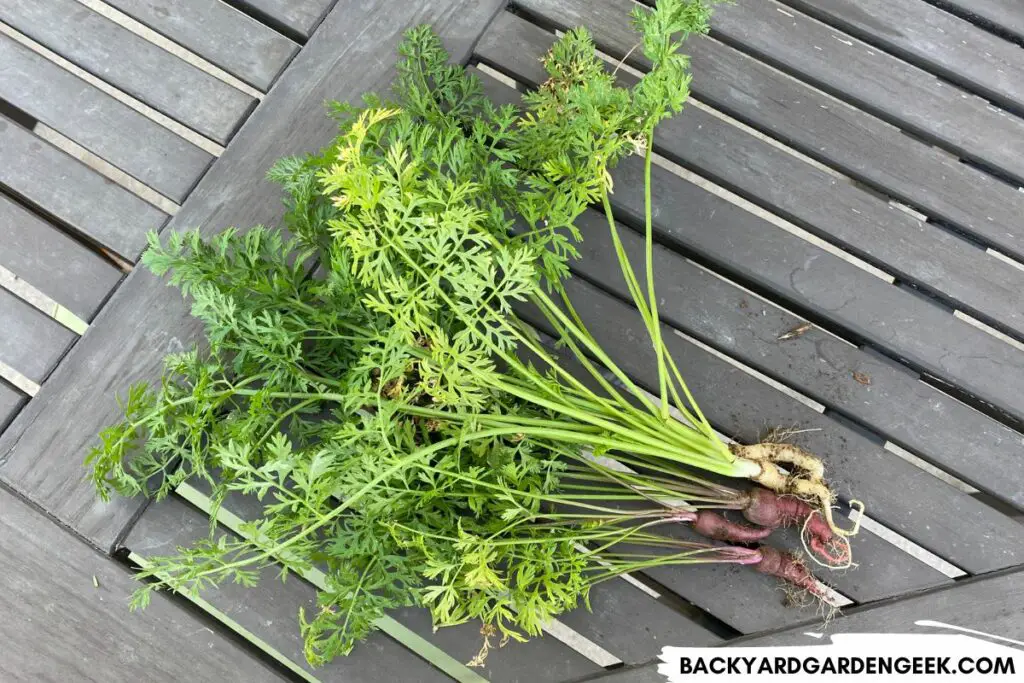
You see, if you give your carrots too much nitrogen, you’re going to get lots of carrot greens but little in the way of the long, oranger root that you’re wanting to grow and eat.
When it comes to fertilizers, wait for your carrot greens to get 3-4 inches tall, then give them a 5-15-15 fertilizer. I’ve seen some people use 0-10-10 as well, but I prefer 5-15-15 so that the plants get a little nitrogen as well since I like to eat carrot greens.
Just don’t over fertilize your plants or give them too much nitrogen. You’ll stunt root growth by encouraging too much carrot green growth.
2. Insecticidal Soap
If there is a large infestation of aphids and ants, the easiest and most natural choice for control is insecticidal soap.
Insecticidal soap is made from the fatty acids of potassium (soap salts) that gardeners have used to keep pests at bay for quite time. One of the great things about this all-purpose natural pesticide is that it can kill large amounts of aphids without harming your plants.
Depending on the infestation’s severity, mix 1-5 tablespoons (15-74 ml) of liquid soap with 1 gallon of water (3.8 L), the fill either a spray bottle or a garden sprayer.
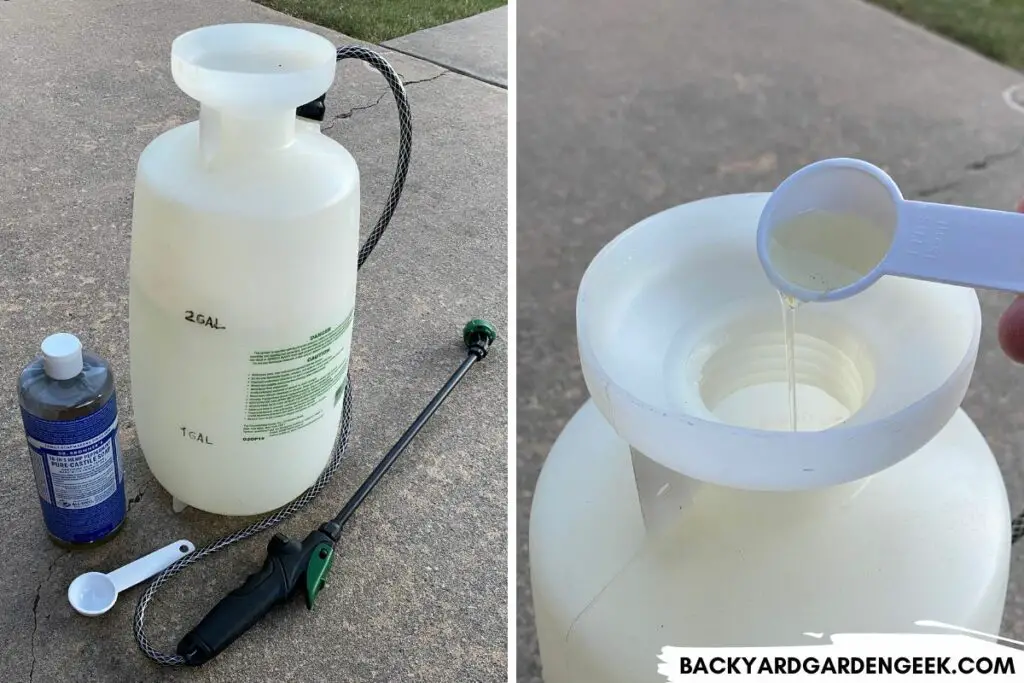
Saturate the foliage on both sides of the leaves to eliminate the aphids. Reapply as many times as needed until you no longer see either aphids or ants.
Caution: Because young carrot top growth is thin, test your mixture on 1 or 2 plants before applying it to all of them.
I’ve written at length about using insecticidal soap to battle soft-bodied bugs such as aphids, spider mites, white flies, and others. If you’d like to learn more, check out these articles:
- 12 Reasons Why Aphids Keep Coming Back + 3 Simple Fixes
- 21 Plants That Aphids Love to Attack + How to Stop Them
- Will Aphids Die in Winter? 5 Things You Need to Know
- Will Aphids Go Away on Their Own? 9 Things to Know
3. Beneficial Nematodes
Suppose you have a chronic ant problem in the garden or outdoor container pots. In that case, beneficial nematodes might be a good option since they’re safe for pollinating insects, mammals, and aquatic life.
Nematodes (roundworms) are microscopic organisms naturally found in soil.
The beneficial ones parasitize and kill insect pests in their larval or pupal stages, preventing egg-laying. With root aphids in particular, the nematodes produce bacteria that enter into the aphids and disrupt their systems, killing them within 24-48 hours.
Tip: When selecting beneficial nematodes for your garden, look for products that target ants and queens. And beware of fire ants since beneficial nematodes might not do too much to them.
Here’s the downside: Beneficial nematodes aren’t an immediate solution to ants, and they won’t do anything to non-root aphid species that are hanging out in the carrot greens.
But for long-term soil health, they can certainly help with pest control, making them exceptional for general pest management in chemical-free growing environments.
4. Borax Bait
Though commonly sold as a laundry booster (such as the 20 Mule Team brand), borax is a naturally occurring chemical compound. It’s toxic to ants and can wipe out an entire ant colony when they eat it.
Mix .5 cups (118 ml) of sugar with 1.5 tablespoons (22 ml) of borax and 1.5 cups (360 ml) of warm water to make ant bait. Then spray it around the edge of your garden beds or smear a thin layer on a small plastic lid and place it where you see ants.
But please be warned: Although borax is a naturally occurring chemical compound, it can harm people and pets if ingested or accidently sprayed in the eyes. Please don’t use it in your garden if you have children or animals running around. Also, wear gloves and protective eyewear when handling it.
Better to be safe than sorry!
5. Diatomaceous Earth (DE)
Diatomaceous earth (also known as DE) is made from ground-up shells of microscopic creatures. It won’t hurt humans or animals, but when insects walk through it, it cuts their exoskeletons and kills them.
Spread a layer of diatomaceous earth on top of the area around your carrots and wherever else you notice ant activity. You’ll need to reapply it if it rains or if you water your plants.
Just make sure to let the soil dry out before you do so.
You can even dust your plants with DE, but please be careful because DE will kill almost any bug that crawls across it, including pollinators and beneficial predators.
I normally prefer liquid soap spray to DE when it comes to dealing with aphids and ants, but if harder-to-kill bugs arrive (such as flea beetles or squash bugs), it’ll help you out with those as well.
6. Proper Watering
Ants don’t eat any part of your carrots, above or below the soil, unless you’re dealing with leafcutter or red fire ants. However, all ants will tunnel and build nests in and around the roots, which is why they like dry soil.
With that in mind, keep your carrots well-watered throughout the growing season, especially during hot summer days or droughts. And don’t forget to water around the edge of your garden and raised beds, which tend to dry more quickly.
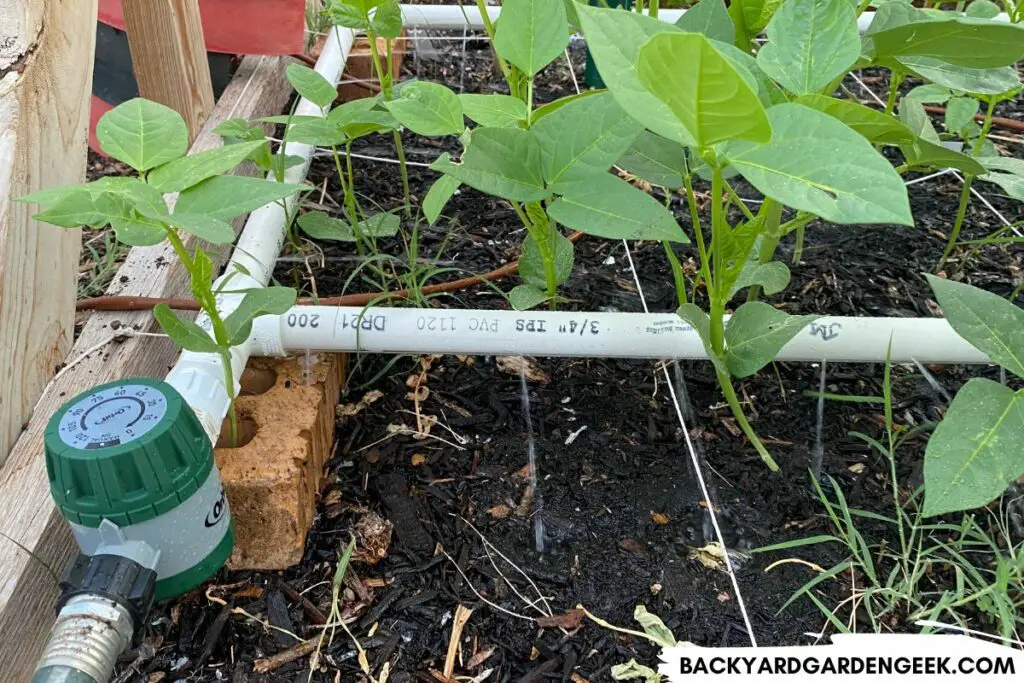
I used to skimp on watering around the parameter to keep water costs down. But when I started watering the edges of my growing area, I saw a visible reduction of ants in my garden.
7. Peppermint Essential Oil
Generally speaking, peppermint oil repels ants due to its strong scents. The chemical compounds of terpene, alcohol, and menthol make peppermint oil a natural fumigant that repels ants.
You can easily make peppermint oil spray. Mix 10-20 drops of peppermint essential oil with 2 cups (473 ml) of warm water in a spray bottle. Spray where you see any ants.
While it won’t kill the ants, it’ll disrupt their foraging behavior. And if you mix .25 cups (60 ml) of distilled white vinegar with the above recipe, the vinegar will obliterate the ant’s pheromone trails, making it hard for them to find their way back.
There’s a big difference between peppermint essential oil found online or in larger, higher-end grocery stores and peppermint extract that you use for baking. Peppermint extract is 4x less potent, so go with the essential oil.
But please be careful if you’ve got pets. Essential oils aren’t great for dogs, and they can harm cats as well. If you have furry friends that like to run around your garden, you’ll want to stick with liquid soap since it’s a pet-friendly insecticide.
8. Companion Planting
A natural way to deter ants from your carrots is to plant strong-scented vegetables and herbs among your carrots.
Ants are not huge fans of the following plants:
- Basil
- Chives
- Garlic
- Onions
- Oregano
- Sage
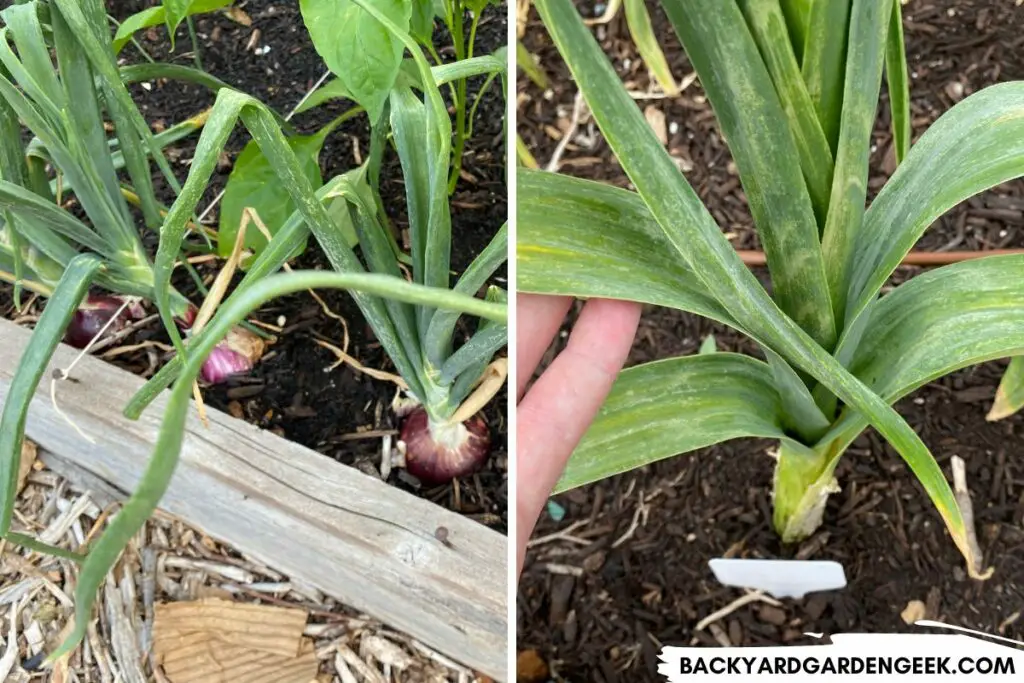
Since you can sow carrot seeds 2-3 weeks before the last spring frost date, plant your onions and chives with them simultaneously. Later in the season, add basil, oregano, and sage to the vicinity.
9. Trap Crops
Since aphids and ants are such good buddies, another approach to getting rid of both is by growing flowers that attract aphids to other parts of your lawn.
If you’ve got a veggie garden, you might plant a beautiful flower garden somewhere nearby. Planting aphid-loving plants is a great natural pest management strategy since the aphids will migrate to the flower and not your lovely vegetables.
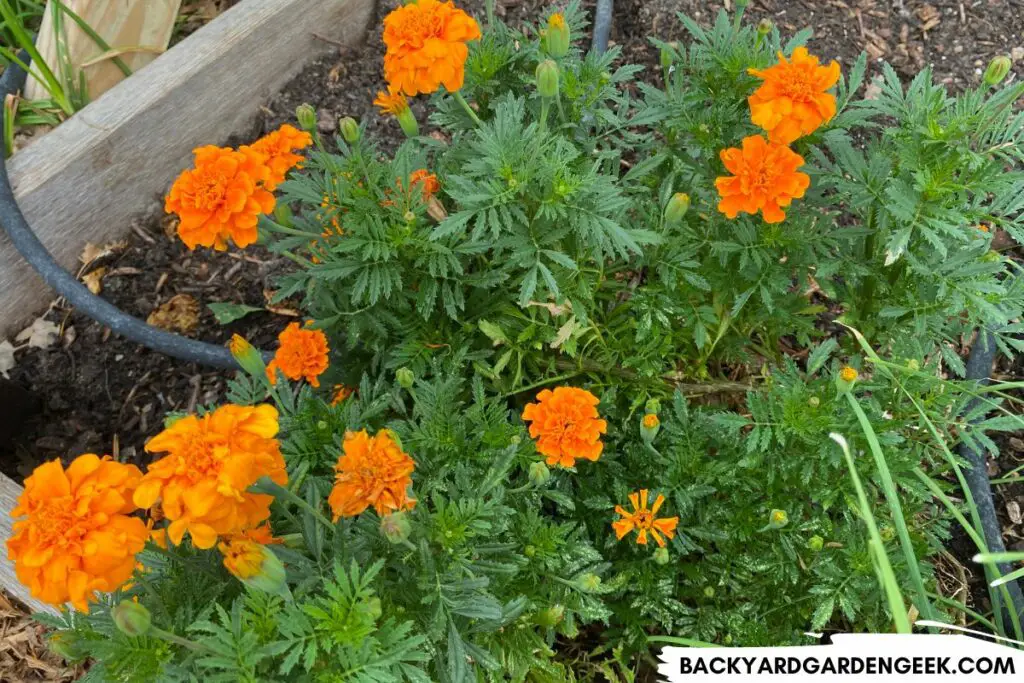
I’ve had success with these aphid-loving flowers:
- Asters
- Calendula
- Cosmos
- Dahlias
- Hollyhocks
- Nasturtium
- Mums
- Zinnias
If you don’t have the luxury of sectioning a part of your garden off for flowers, flowerpots and containers work just fine.
10. Sluggo
Another way to get rid of ants in your garden or planters is to use non-toxic pellets, such as Sluggo.
I know Sluggo is for the control of slugs and snails; however, it kills ants as well when they ingest the pellets.
You can sprinkle the pellets around ant mounds or on the soil where you see ant trails. Wet the pellets to activate them and reapply them after heavy rain.
Here’s a funny thing: I know of gardeners who haven’t had any success using Sluggo to get rid of slugs and snails but who’ve had plenty of success using it to get rid of ants.
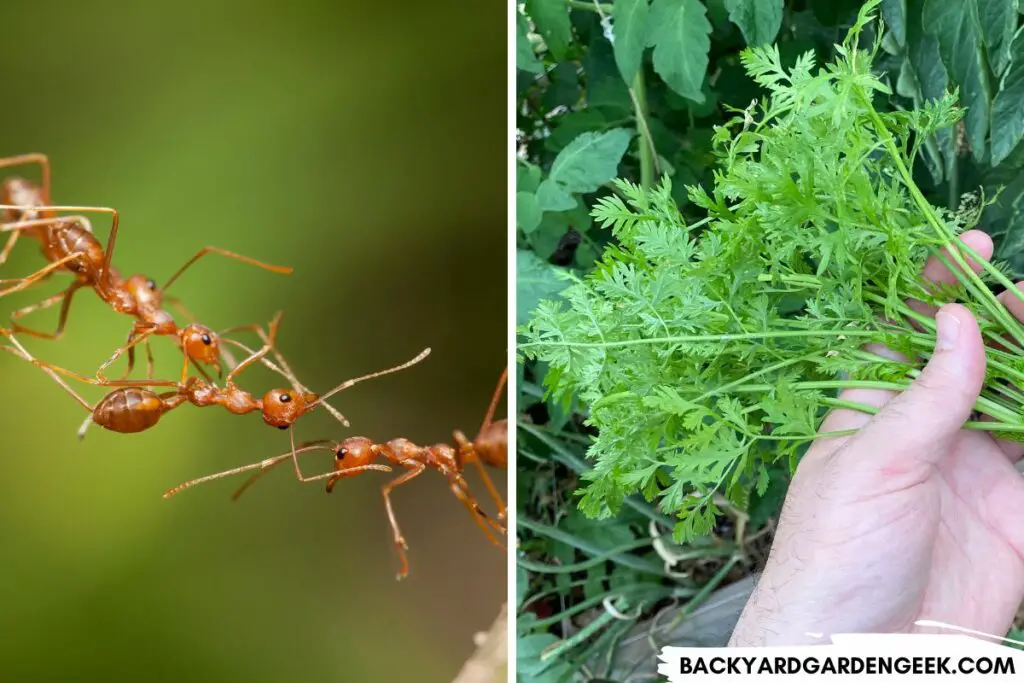
Will Ants Eat or Ruin My Carrots?
Just so you know, ants will not eat your carrots unless you’ve got a case of leafcutter or red fire ants.
As a general rule, carrots are not a common food source for ants since they prefer sweeter, more sugary substances, such as aphid honeydew. Unless your carrots are rotting or covered in aphids, they’ll typically scavenge elsewhere for food.
However, when ant colonies get large enough, their tunneling can harm or weaken the root system of your carrots.
But even if they’re not eating your carrots, can ants harm or ruin them in some way?
Aphids and ants have a mutually beneficial symbiotic relationship. As aphids start eating the carrot tops, they excrete honeydew droplets, a sweet, sugary liquid that attracts ants. In exchange for that honeydew, the ants will tend to and even “herd” the aphids, moving them around and protecting them from predators.
If this is something you’re interested in learning more about, check out these articles on the symbiotic relationship between ants and aphids:
- Do Aphids Attract Ants?
- Do Ants Eat or Kill Aphids? 6 Environmental Factors
- Do Ants Make Aphids Worse? 7 Behaviors to Understand
- Why Do Ants Protect Aphids? 7 Things You Should Know
Several types of aphids can infest your carrots, with green peach aphids being the most notorious of all.
Unfortunately, aphids are bad news since all of them can be vectors for disease transmission to other plants in your garden.
You’ll want to spot them early, eradicate them, then help your plants recover from the infestation.
And if they seem to go away on their own, don’t be fooled. New aphid species can arrive and take their place, and they can even live through freezing weather and protect themselves against the cold winter months.
Keep in mind that aphids multiply rapidly during your garden’s growing season–no male aphids required to do so!–and a few aphids on your carrot greens one day can quickly become hundreds the next.
If you see ants crawling on your carrots, do a quick look for aphids, then get out that liquid soap spray (or your preferred method) and get rid of them before they spread!
Additional Reading
The best way to keep aphids from destroying your plants is to learn more about them and how to manage them. On that note, check out the articles below for more aphid-related information:
